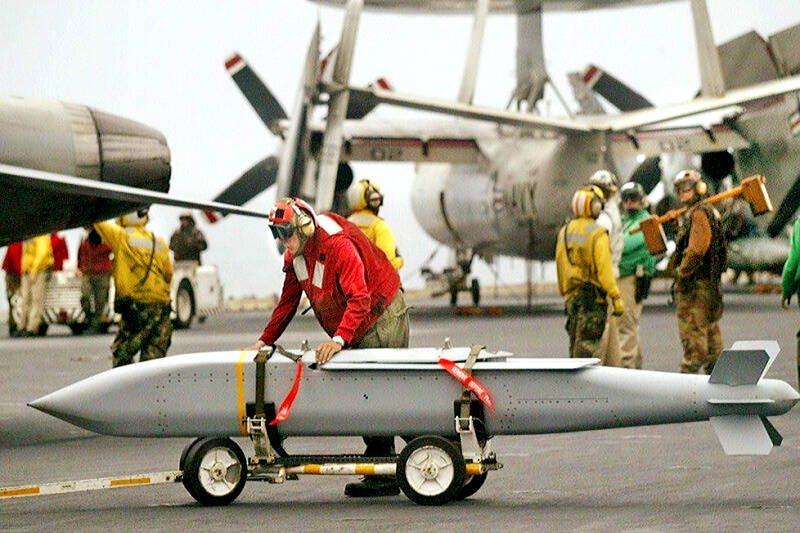The US Department of Defense is to partner with RTX Corp, formerly Raytheon Technologies Corp, to deliver 50 AGM-154 Joint Standoff Weapons (JSOW), or glide bombs, to Taiwan over the next four years, a report published on Friday showed.
The report, published on the department’s Web site on Friday, said that 50 AGM-154 Block III C JSOWs would be delivered to Taiwan under a fixed-price contract worth US$68.4 million.
Most of the production of the weapons would be done in Tucson, Arizona, and would be completed by March 2028, the report said.

Photo: AFP
The report comes after Reuters on Thursday quoted US officials as saying that the US military had left equipment in Australia following last year’s Talisman Sabre 23 joint exercise, with the intention that it could be used by US forces in the event of a conflict with China over Taiwan.
The glide bombs are part of a larger arms package of seven items initially announced by the US in June 2017. It also included the AGM-88 HARM (High-speed Anti-radiation Missile) and other weapons that could be used with Taiwan’s F-16 jets. The weapons were intended to complement other upgrades to Taiwan’s F-16 fleet, which also included radar and communications system upgrades.
The AGM-154 is a JSOW that emerged through the US Navy’s Advanced Interdiction Weapon System program launched in 1987, which sought to develop weapons that are usable day or night, and in any weather conditions.
The JSOWs designed for the program are “fire and forget” weapons, meaning they do not require external guidance after launch. Instead, they navigate to their targets via a GPS/inertial navigation system. JSOW weapons have been replacing conventional laser-guided bombs, and the newest JSOW weapons also incorporate infrared guidance systems.
JSOW weapons dropped at high altitude can reach targets as far as 110km away, and those launched at low altitude can strike up to 22km away, which would enhance the F-16 jet’s land attack capabilities.
Countries other than the US that are purchasing AGM-154 glide bombs include Taiwan, Australia, Finland, Greece, Poland, Singapore and Turkey.
Taiwan has facilitated the incorporation of the weapons into its fleet by upgrading its older F-16A/B fighter jets to the F-16V variant through the Phoenix Rising Project and through the purchase of newer Block 70 fighters.
The upgraded jets as well as the Block 70 fighters can carry AGM-154C glide bombs, which could help diversify the Taiwanese air force’s air-to-ground combat capabilities.

SECURITY: As China is ‘reshaping’ Hong Kong’s population, Taiwan must raise the eligibility threshold for applications from Hong Kongers, Chiu Chui-cheng said When Hong Kong and Macau citizens apply for residency in Taiwan, it would be under a new category that includes a “national security observation period,” Mainland Affairs Council (MAC) Minister Chiu Chui-cheng (邱垂正) said yesterday. President William Lai (賴清德) on March 13 announced 17 strategies to counter China’s aggression toward Taiwan, including incorporating national security considerations into the review process for residency applications from Hong Kong and Macau citizens. The situation in Hong Kong is constantly changing, Chiu said to media yesterday on the sidelines of the Taipei Technology Run hosted by the Taipei Neihu Technology Park Development Association. With

A US Marine Corps regiment equipped with Naval Strike Missiles (NSM) is set to participate in the upcoming Balikatan 25 exercise in the Luzon Strait, marking the system’s first-ever deployment in the Philippines. US and Philippine officials have separately confirmed that the Navy Marine Expeditionary Ship Interdiction System (NMESIS) — the mobile launch platform for the Naval Strike Missile — would take part in the joint exercise. The missiles are being deployed to “a strategic first island chain chokepoint” in the waters between Taiwan proper and the Philippines, US-based Naval News reported. “The Luzon Strait and Bashi Channel represent a critical access

CARROT AND STICK: While unrelenting in its military threats, China attracted nearly 40,000 Taiwanese to over 400 business events last year Nearly 40,000 Taiwanese last year joined industry events in China, such as conferences and trade fairs, supported by the Chinese government, a study showed yesterday, as Beijing ramps up a charm offensive toward Taipei alongside military pressure. China has long taken a carrot-and-stick approach to Taiwan, threatening it with the prospect of military action while reaching out to those it believes are amenable to Beijing’s point of view. Taiwanese security officials are wary of what they see as Beijing’s influence campaigns to sway public opinion after Taipei and Beijing gradually resumed travel links halted by the COVID-19 pandemic, but the scale of

Pope Francis is be laid to rest on Saturday after lying in state for three days in St Peter’s Basilica, where the faithful are expected to flock to pay their respects to history’s first Latin American pontiff. The cardinals met yesterday in the Vatican’s synod hall to chart the next steps before a conclave begins to choose Francis’ successor, as condolences poured in from around the world. According to current norms, the conclave must begin between May 5 and 10. The cardinals set the funeral for Saturday at 10am in St Peter’s Square, to be celebrated by the dean of the College